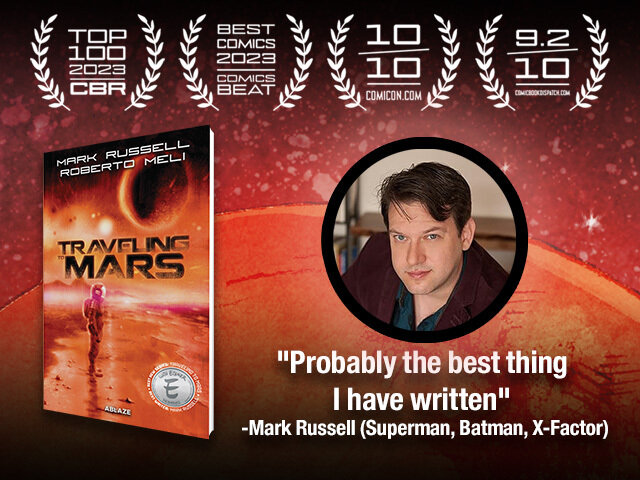Check out this interview with Mark Russell
6 months ago
– Thu, Jun 06, 2024 at 07:31:50 AM
Another great interview with Mark about Traveling To Mars, the campaign and more!
Traveling to Mars: Mark Russell Talks SciFi Satire and Kickstarter
Traveling to Mars is one of the best Science Fiction comics of recent years, and we interview writer Mark Russell on the Kickstarter campaign
Published Wed, 05 Jun 2024 13:03:08 -0500by Adi Tantimedh
Article Summary
- Explore Mark Russell's satirical comic 'Traveling to Mars' and its Kickstarter campaign.
- Meet Roy Livingston, a terminal man on a poignant final journey to Mars.
- Uncover the critique of capitalism and human civilization in the SciFi satire.
- Get a sneak peek at the anticipated 'Traveling to Mars' graphic novel collection.
Traveling to Mars is one of the welcome surprises of recent comics and possibly the best work Mark Russell has written to date with wonderfully expressive art by Roberto Melo. He thinks so, too. Now, the 11-issue series from ABLAZE Publishing is getting a Kickstarter campaign for a deluxe collected edition in digital, hardcover, and softcover versions.
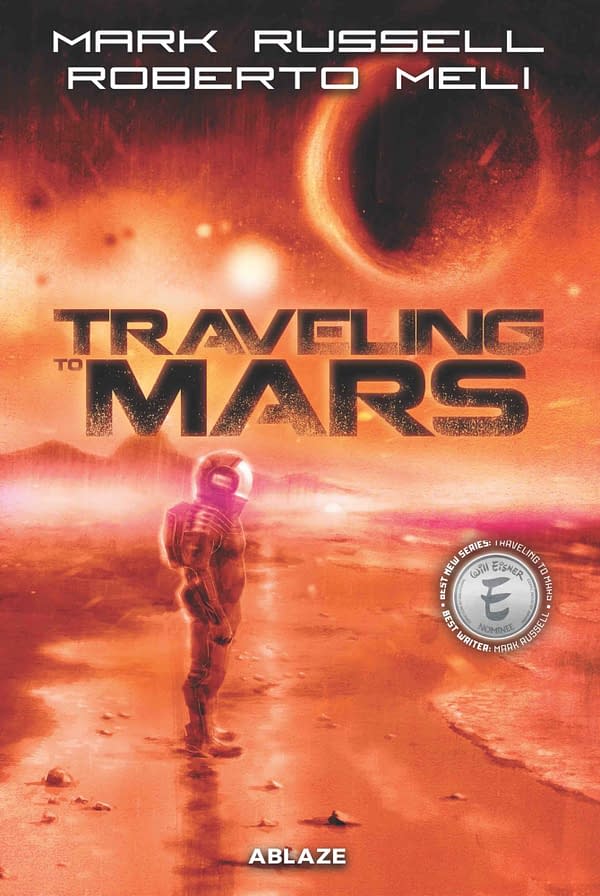
Traveling to Mars introduces us to former pet store manager Roy Livingston, the first human to ever set foot on Mars. Roy was chosen for this unlikely mission for one simple reason: he is terminally ill and, therefore, has no expectation of returning. Roy is joined on his mission to Mars by Leopold and Albert, two Mars rovers equipped with artificial intelligence, who look upon the man as a sort of god. Against the backdrop of not only his waning days but those of human civilization, Roy has plenty of time to think about where things went wrong for both of them and what it means to be a dying god—a riveting story of planetary exploration and of finding meaning in your final days.
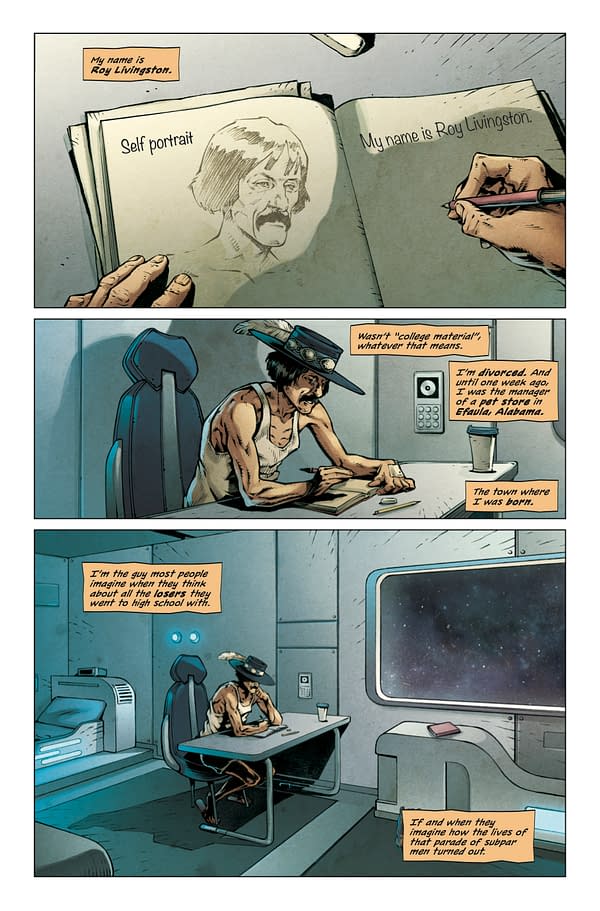
I was happy to interview Mark Russell since it's one of my recent favourite comics.
Hi Mark, I'm happy to talk to you about Traveling to Mars. It's one of my favourite Science Fiction comedies of recent years. It features your recurring satirical themes about capitalism. What was the inspiration behind the story? Were there any books, movies, or TV shows that informed it?
The one everyone seems to compare it to is Silent Running, which I saw when I was a kid, but I don't remember much about it, so maybe it was a subconscious influence. But, for me, I think the biggest influence was just all the talk by billionaires and pundits about the importance of building human colonies on Mars while the Earth, the ONE PLANET WE'VE EVOLVED TO LIVE ON, is literally on fire. Traveling to Mars started as a sort of satire on that sort of far-sighted stupidity and how all our rovers on Mars and flags on the Moon are looking more and more like just an expensive epitaph for the human race. From there, it evolved to be more about Roy, how he was undergoing his own extinction, and how we each look for meaning at the end.
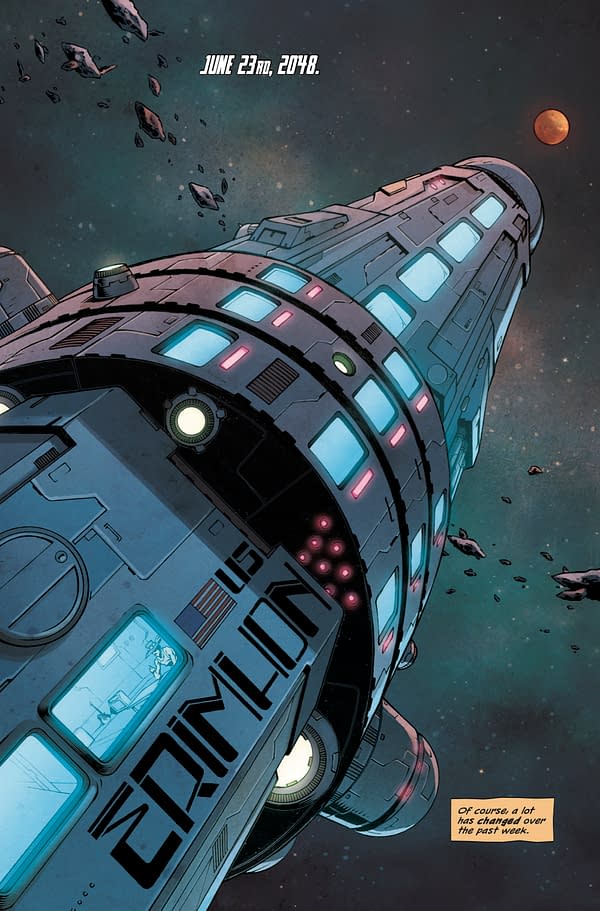
How Traveling to Mars Subverts Old Science Fiction Conventions
It feels like a gleeful – if sad – subversion of the John W. Campbell Science Fiction of competent professional men setting out on a triumphant conquest of Mars where instead of a strapping, confident man, you have a sad, broken, dying man who's been beaten down by Capitalism and the lie of the American Dream being sent to Mars to claim the planet not for the betterment and enlightenment of Mankind, but to grab rights to resources for a dying Earth. Am I wrong to say this one feels like one of your purest, most uncompromising stories?
It definitely is. I was allowed to write it the way I wanted, with zero concerns about whether there was enough action or whether a story ended neatly in twenty pages. I was just allowed to write this highly personal story about a man looking back from the end of the world at his own regrets and loves. I think the ending is bittersweet because it is a story about the ending but also about how we are a part of a greater constellation of the lives we have changed. I hope people read this story and take it as a reminder to stand back and just look at the stars from time to time.
How did you come up with Roy Livingston? He's a very specific character rather than a stereotype and archetype?
I feel like, in a lot of ways, he's the sort of guy I would have grown up knowing. A guy who would have big dreams, maybe plan in a band for a year or two and then settle into a job, not wondering where all the time had gone or who it was they really were until all the time was gone.
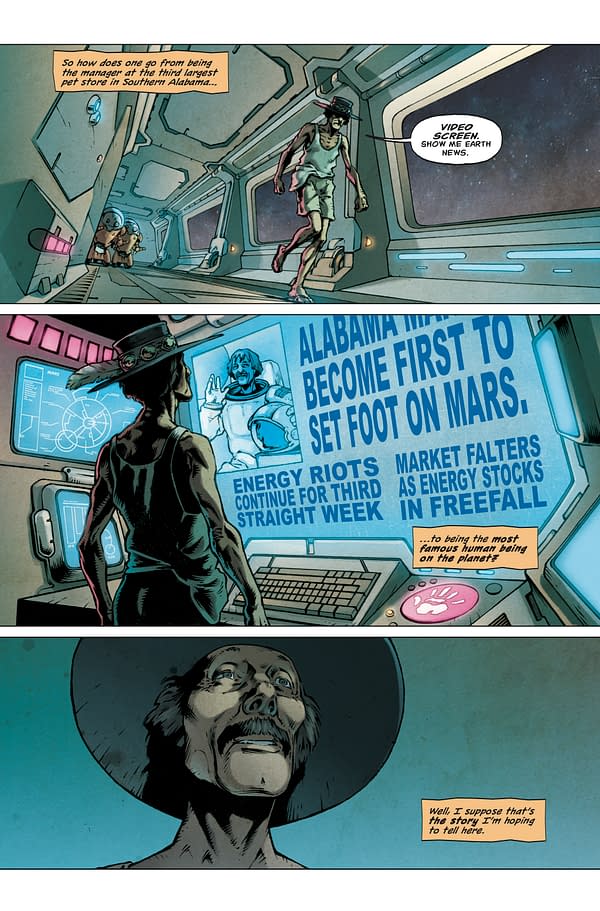
On the Messiness of People Working Under Capitalism
One of the more interesting parts of the story is your portrayal of the corporate folks who send Roy to Mars. Instead of the grinning, callous monsters that are the easy default, you showed them as not always bad people, just people who did their best under a terrible, self-serving system. Some of them tried to be as humane with Roy as possible. Granted, they have to keep him sweet lest he turns heel and tells them to fuck off and completely screw up their plans. Can you talk about your thinking in writing it?
I think one of the most horrifying inventions in human history is shareholder value. The idea is that, no matter how profitable a business already is, no matter if you have to wipe out an entire species or create a famine that starves millions, your first and only moral duty is to make the shareholders a fraction of a percent richer. And it works precisely by allowing normally decent human beings to occupy a small niche in the machine so no one feels too guilty about it. All the shareholders know is they're getting solid returns. All the insurance claim officers know is that they get a bonus if they turn down more claims. Almost no one actually has to face the people whose lives they're destroying. The great progress of human civilization has been to go from having to stab someone in the gut to steal their stuff to being able to press a button and let a machine do it for us. And how can we possibly be a bad person or feel guilty about our wealth if we're merely better at pressing buttons?
Was there ever a temptation to tell the story of these corporate flunkies, each with their own story, desperately trying to keep control of the situation on Earth, including a rival corporation trying to scam Roy with an imposter of his lost wife? That seemed to be a darkly comic satirical story in itself.
No, not really. I figured out pretty early on that this had to be Roy's story, told from his perspective; I wanted to have things he wasn't there to witness or imagine as "off-camera" as possible.
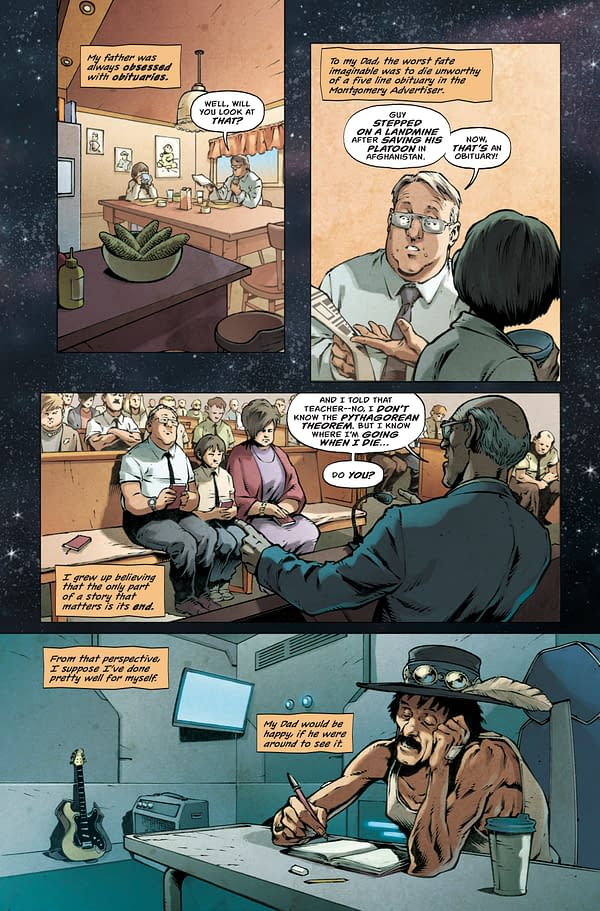
Lovable Robots as the Last Hope for Humanity
Did you create the sad, lovable robots as a parallel and reflection of Roy? They're there to help, but they're also like kids, and it feels like he and the robots are babysitting each other. And they are the big payoff at the end of the story. They become his legacy.
I think it's just the nature of being young, trusting, and in awe of someone who may not deserve it. And I wanted to write them so you could see them developing their own personalities as they have their own experiences of the world, as tiny as those experiences are. It was more, I think, a reflection of what we all go through as children trying to figure out the rules of this place.
I know many comics publishers launch Kickstarters with their most anticipated books for various reasons, including gauging interest. What are your feelings about getting the Kickstarter treatment?
I am totally fine with it. The bottom line is that we are getting a really beautiful hardcover edition, and I hope that this is how people read the story. It's meant so much to me to be able to write this story the way I was able, and it just tells me that Ablaze really values it, too.
Thank you, Mark. Thanks for talking to me.
The Kickstarter for the Traveling to Mars graphic novel collection is running until June 26th.




